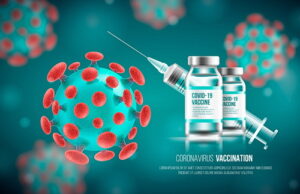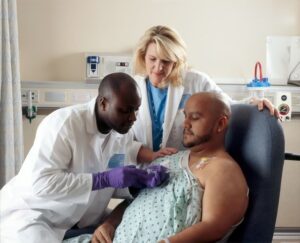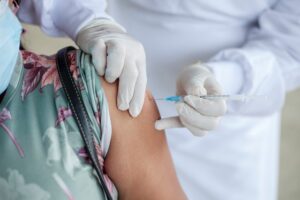
The covid virus continues to mutate, leading to new variants of the disease. Some variants, including the Delta variant, Omicron, and the latest XE, may spread more easily than others or may be more resistant to treatments or vaccines, which is why individuals with cancer and cancer survivors need to know a few important things about the disease.
It is hard to say how each individual’s body responds to these variants, as factors such as the amount of contact a person has with others (social engagements, mass transit, shopping, etc.) the amount of protection a person uses (vaccines, masks, washing hands), the strength (or lack of) one’s immune system which correlates to the risk factor of the individual. If you are in the category of having immune deficiencies, such as cancer or other high-risk factors, this article may be of some help.
#1. All Cancers Put You at a Higher Risk But Blood Cancer is of Extreme Importance Regarding Covid

If you have cancer and are getting treatment for the condition, your immune system is compromised. This means that your body is not as strong as a healthy person’s immune system and subsequently, you could well be at a higher risk of contracting these viral infections.
A specific type of cancer that can significantly increase your risk is blood cancer. Patients with blood cancer are severely immune-compromised, and their risk of getting the infection is much higher than patients with solid tumors. Their immunity is low because they have much lower levels of immune cells to generate antibodies that fight against the virus.
#2. Get the Vaccine But Speak to Your Doctor First!

All patients with cancer and cancer survivors aged five and above are required to get a primary COVID-19 vaccine. The COVID-19 vaccine can be any one of the following{
- Two doses of Moderna
- Two doses of the Pfizer-BioNTech vaccine
- Single-dose of Johnson’s and Johnson’s vaccine
If you are a cancer patient and have recently received treatment, such as chemotherapy, or bone marrow transplant, it is best to consult with your doctor before you get the vaccine. Your immune system must be recovered before you get the preventive vaccine against the virus.
#3. You May Need an Additional COVID-19 Vaccine Dose
Apart from the primary vaccine, you may also need an additional dose. This additional dose is different from the booster that is recommended to those who have received the initial vaccine and it covers all variants, including the latest one – Omicron.
Since cancer patients have a weakened immune system, their bodies generate a weaker response. Therefore, there may be a need for getting an additional dose following the completion of the primary vaccine series. Speak to your doctor about the need, dosage, and timing for the shot.
#4. Should You Get the Second Booster Dose?
A booster dose is different from an additional dose. A booster dose is given to people who have received the primary vaccine after the antibodies have diminished. The second booster dose is recommended for everyone aged 12 and above, especially for seniors who can get the shot now and those under 65 should be able to get the shot as well.
In general, if you are getting cancer treatment or are severely immuno-compromised, you will need the booster shot, but again, we recommend talking to your medical professional before proceeding with the next dose.
#5. You Can Still Get COVID-19 Following Your Vaccination
Everyone, healthy and immune deficient, know that you can still get COVID-19 despite being vaccinated. It might seem alarming, but if you have compromised immunity, you need to rely on other measures along with getting vaccinated to protect yourself and prevent the spread of COVID-19.

Some of the measures that you should continue to take despite relaxed restrictions include:
- Covering your face with a mask that fits well and covers your mouth and nose
- Avoiding public gatherings and crowds
- Maintaining a distance of six feet from people you don’t live with
- Frequent and thorough hand washing
- Monitoring your overall health and well-being
What Should I Do if I Develop Symptoms of Infection?

If you think you have been exposed to the coronavirus or have developed the symptoms of the infection, it’s best to isolate yourself and get a COVID-19 test as soon as possible. At-home tests can tell you if you are infected, but there are a lot of false positives; however, if it shows you do have covid, you most likely do. It is best to go to a medical facility to get a PCR test. If the test results show that you have the infection, make sure you get in touch with your primary healthcare provider and update them about your condition.
If you develop mild to moderate symptoms, your healthcare provider may prescribe you antiviral medications or antibody treatment to prevent your illness from worsening. Your healthcare provider will also give you an insight into possible drug interactions between the medications for COVID-19 and the treatment you are getting for cancer.
In some cases, your healthcare provider may decide to pause your cancer treatment while you get the treatment for the virus.
Final Words
Coping with cancer is stressful and this anxiety has increased amidst the pandemic. If you have been diagnosed with cancer, are getting cancer treatment, or are a cancer survivor, know that there are several ways you can protect yourself from getting COVID-19. Continue to cover your face with a face mask, practice frequent hand washing, maintain six feet social distance, and avoid public gatherings.



 There is no one effective formula that can help in reducing weight quickly. Individuals have to take a number of measures to avoid accumulation of excess body fat. For many, a healthy diet plan coupled with aerobic exercise is the most effective way to combat obesity.
There is no one effective formula that can help in reducing weight quickly. Individuals have to take a number of measures to avoid accumulation of excess body fat. For many, a healthy diet plan coupled with aerobic exercise is the most effective way to combat obesity.